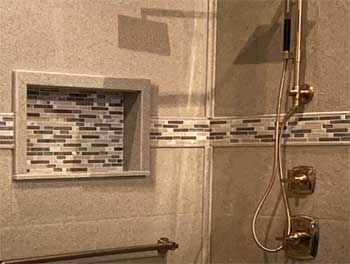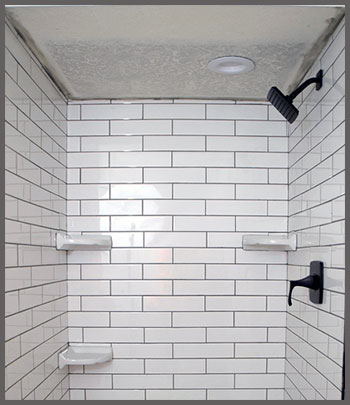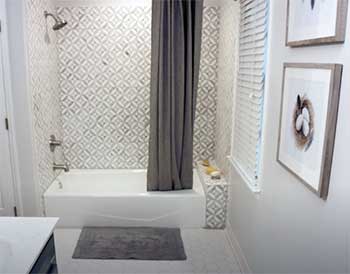Are you considering remodeling your bathroom, and you’re torn between using onyx or tiles for your shower?
The choice of material for your shower can greatly influence the functionality, durability, aesthetics, and overall value of your bathroom. Let’s dive into the pros and cons of both onyx and tile showers to help you make a more informed decision.
A Brief Comparison Table
| Comparison Aspects | Onyx Showers | Tile Showers |
| Material Composition | A naturally occurring stone, a type of quartz. | Can be ceramic, porcelain, glass, or stone. |
| Appearance | Glossy, translucent surface with unique patterns and colors. | Variety in colors, shapes, textures for personalized designs. |
| Installation Process | Easier with large, seamless panels. | Time-consuming but allows for intricate designs. |
| Durability | Softer, prone to scratches, needs occasional polishing. | Harder, more resistant to daily wear, grout requires cleaning. |
| Maintenance | Easier due to fewer grout lines. | Requires regular cleaning, particularly of grout lines. |
| Cost | Generally more expensive due to luxury appeal and installation. | More economical, prices vary based on tile type. |
Unraveling the Charm of Onyx Showers
Onyx, a naturally occurring stone, holds an aesthetic appeal that’s unmatched. It’s glossy, reflective, and comes in a wide array of colors and patterns. Here’s why you may want to consider it for your shower.
Pros of Onyx Showers
Onyx has surged in popularity for shower installations in recent years. This natural stone makes a dramatic design statement while providing several benefits:

Luxurious, Spa-Like Appeal
Onyx has a smooth, creamy, minimalist appearance that looks upscale and feels like a spa. The stone is formed from naturally deposited minerals and has a translucent quality.
When backlit, onyx showers emanate a gentle glow, creating a soothing vibe. The pale white stone adds an airy, open look to small bathrooms.
Naturally Non-Porous and Waterproof
Onyx is impermeable to water and will not absorb moisture like some natural stone. This makes it an ideal low maintenance choice for showers.
You don’t have to apply sealants regularly to prevent water damage. Onyx showers are naturally waterproof.
Easy to Keep Clean
The nonporous surface of onyx does not allow mold, mildew, or soap scum to take hold. A simple wiping down with a squeegee after showering is generally all that’s needed to keep the stone pristine.
Harsh chemical cleaners are not required. For periodic deep cleaning, a gentle pH neutral stone soap works well. The smooth surface resists hard water staining too.
Slip Resistant and Safe
Onyx has a naturally grippy texture, even when wet. This gives it excellent non-slip properties in the shower without having to add rubber mats or appliqués.
The stone is barefoot friendly and provides a safe shower flooring solution. Proper sealing enhances the natural traction.
Durable and Long Lasting
Onyx is incredibly durable and able to withstand heavy use in the shower area. It does not chip, crack, or show wear and tear over time like tile can.
Professionally installed onyx showers will last for decades with proper care. This makes the investment in natural stone worth it.
Great Resale Value
Upscale bathrooms with onyx showers can greatly boost the value of your home. Natural stone conveys luxury living and is expected in higher-end real estate.
Tile showers also add value, but onyx is viewed at the highest tier of bathroom finishes.
Cons of Onyx Showers
While onyx has many advantages, there are some downsides to weigh as well:
Expensive – Natural onyx is only sourced from a few regions worldwide, making it costly to import and fabricate. Expect to pay $5,000 to $15,000 for an onyx shower installation.
Professional Installation Required – Onyx showers must be installed by qualified stone contractors. DIY installation is not possible due to the weight and fragility of slabs.
Cool Surface Temperature – Onyx can feel quite cool underfoot, especially during longer showers, as natural stone absorbs body heat. This contrasts with tile that retains warmth.
Limited Design Options – Onyx only comes in white or very light shades. There are no color or pattern variations. Tile offers countless options for colors, prints, mosaics, and borders.
Damages Are Noticeable – Any chips, cracks, or scrapes on the surface will be instantly apparent and may be difficult to repair. These flaws detract from the appearance.
For buyers that can handle the high cost and limited design choices, onyx delivers an unmatched shower experience. Next we’ll look at how tile showers compare.
Tile Showers: A Timeless Option
Tile showers are popular for their versatility in design and resilience. They come in a plethora of colors, sizes, textures, and materials, making them a more customizable option.
Pros of Tile Showers
Tile has traditionally been the most popular material for shower walls and floors. Some top benefits of tile include:

Affordable – Ceramic, porcelain, and even some stone tiles can be purchased very inexpensively. Basic white subway tile starts at just a few dollars per square foot. Mosaic sheets, accents, trim, and decorative options still fit many budgets.
Easy to Install – Tile projects can realistically be DIYed, especially with large format tiles. Or you can hire a professional tiler for installation.
Variety of Looks – Tile comes in every imaginable color, pattern, texture, and style. Mix and match designs or create a cohesive custom look. Mosaics, borders, accents add visual interest.
Warmer Underfoot – Unlike stone, tile holds warmth from the heated water and your body. This makes it more comfortable to stand on during extended showers.
Small Repairs Possible – If a few tiles become damaged or stained over time, you can swap those pieces out. With onyx, the whole slab may need replacing.
Grout Adds Traction – Grout lines in tile provide increased slip resistance. New textured tiles also boost traction.
For design flexibility at budget-friendly prices, tile is hard to beat. Let’s look at the drawbacks.
Cons of Tile Showers
There are a few potential disadvantages of tile showers to consider:
Seams – The grout lines create visible seams that can discolor or collect mildew. This interrupts the smooth look and requires more cleaning attention.
Not Waterproof – Regular tile and grout allow water absorption. A waterproof membrane must be installed underneath to prevent leaks and damage.
Cool Feel – Like natural stone, tiles do not retain heat well and can feel cool during showering. Warmer bathroom ambient temperature can help.
Difficult to Clean – Grout becomes dingy looking without thorough scrubbing. Mold and soap scum build up easily in the crevices and texture.
Prone to Cracks and Damage – Grout and tile can deteriorate, crack, pop off, or show wear over time with structural movement or improper installation.
Lower Resale Value – Tile bathrooms are expected and standard. Higher end stone showers will yield greater returns upon resale.
While tile requires more maintenance, its customizability and affordability make it a perennial shower lining choice.
Key Differences Between Onyx and Tile Showers
Understanding the key differences between onyx and tile showers can significantly simplify your decision-making process. Let’s break them down:
- Material Composition and Appearance

Onyx is a type of quartz, a naturally occurring stone, featuring a smooth, translucent surface with a lustrous finish.
The unique veining patterns and color variations in onyx make each piece unique.
On the other hand, tiles can be made from various materials, including ceramic, porcelain, glass, or stone.
They come in numerous colors, shapes, and textures, allowing for highly personalized designs.
- Installation Process
Onyx showers typically comprise large, seamless panels, which make installation quicker and easier. These panels reduce the chances of water leakage and promote easy cleaning.
In contrast, tiles are smaller units that need to be individually installed, which requires more time and precision. However, the small size of tiles allows for intricate designs and patterns.
- Durability and Maintenance
Onyx is slightly softer than most tiling materials, making it more prone to scratches and damage over time. It requires careful handling and occasional polishing to maintain its shine.
Tiles, particularly ceramic and porcelain ones, are harder and more resistant to daily wear and tear. However, the grout lines between tiles require regular cleaning to prevent the build-up of mold and mildew.
- Cost
There is a significant cost difference between the two. Onyx is a luxury material and is generally more expensive, both in terms of the material cost and the installation.
Tiles are a more economical choice, with prices varying based on the type of tile chosen. They offer a balance between cost-effectiveness and durability.
- Slip Resistance

Onyx has naturally good traction. Tile may require additives for slip resistance.
- Heat Retention
Onyx feels cooler underfoot. Tile holds warmth better.
- Waterproof
Onyx is naturally waterproof. Tile requires a waterproof membrane during installation.
- Customization
Onyx only comes in white/light shades. Tile can be customized with patterns, colors, textures.
- Resale Value
Onyx boosts property value more than tile.
In conclusion, both onyx and tile showers have their unique characteristics. Whether it’s the elegant allure of onyx or the timeless appeal and practicality of tiles, your choice ultimately depends on your aesthetic preferences, budget, and maintenance willingness.
FAQs: Unearthing the Details
Before wrapping up, let’s answer some of the common queries related to onyx and tile showers.
Yes, onyx is an excellent choice for shower walls, especially if you value aesthetics and ease of maintenance. However, it’s a pricier option and may require a bit more care due to its softer nature.
An onyx shower is relatively easy to clean. Avoid abrasive cleaners that could scratch the surface. Warm water mixed with a mild soap or a specially designed stone cleaner can work best. Always rinse thoroughly and dry to prevent water spots.
When wet, onyx can be quite slippery. However, using non-slip mats or applying a non-slip coating can significantly improve safety.
Ceramic and porcelain tiles are top choices for showers due to their durability and water-resistant properties. They also come in an extensive range of designs to suit any aesthetic.
Wrapping Up
In conclusion, the decision between onyx and tile showers boils down to your preferences and budget. Onyx showers promise opulence and low maintenance, while tile showers deliver versatility, durability, and cost-effectiveness.
Take these factors into account, and you’ll make a choice that serves you best.
This guide provides a comprehensive comparison of onyx and tile showers. But remember, every bathroom is unique.
Consider seeking advice from bathroom remodeling professionals to find the most suitable solution for your specific situation.
